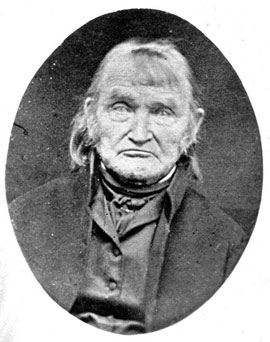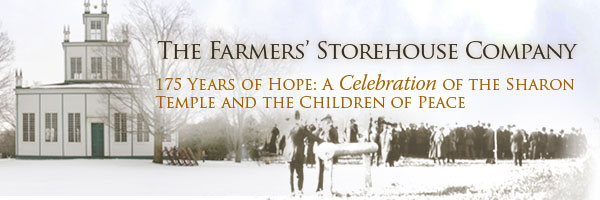
Table of Contents
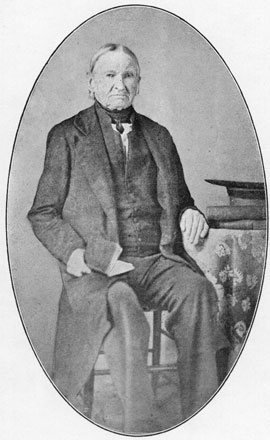
David Willson was a radical democrat who sought to protect the poor.
The temple was built four square, symmetrical on each side, to symbolize the equality of all people who entered.
Willson attracted large crowds wherever he preached, and obviously struck a responsive cord in his audience, whether recent British emigrants or those born in North America. But Willson was not only a preacher; he was also an innovative political and business organizer.
This photograph was taken in old age, shortly before his death in 1866.
Sharon Temple Museum Archives
Many early first hand accounts of the Children of Peace mention their cooperative marketing of wheat The Children of Peace were not distinctive here, but the lead in a much wider movement, the Farmers Storehouse, Canada’s first marketing co-operative. The Farmers’ Storehouse was one of those means by which the farmers of the Home District creatively sought to evade the problem of debt to merchants which deprived them of their economic and political freedoms.
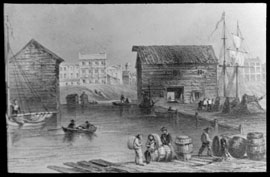
Click to see a larger image (40K)
Photograph of a painting showing a Toronto harbour
scene at the foot of Church Street, 1850
William H. Hammond fonds
Reference Code: F 4436-0-0-0-8
Archives of Ontario, I0021811
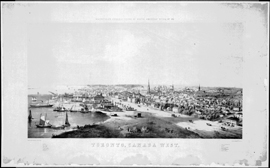
Click to see a larger image (92K)
Whitefield's original views of North American cities, no. 30: Toronto,
Canada West: from the top of the jail, 1854.
Miscellaneous Map collection
Reference Code: C 279-0-0-042
Archives of Ontario, I0004748
The Farmers’ Storehouse was organized in 1824. It built a large warehouse on the shoreline of Toronto where the St Lawrence market building now stands. The Store collectively marketed farmers’ wheat in Montreal, and sold them finished goods at reduced rates.
Importantly, the members of the company were allowed to take goods and cash to the value of their stock from the store; the company thus became a loan office of first resort for the farmers of the district who needed to borrow small sums. It is this telling innovation which in large part explains the draw of the company; not only did members of the concern earn their own profits from the wheat trade, circumventing the Toronto merchants to whom they would otherwise fall in debt, but they also, in fact, established a bank of their own.
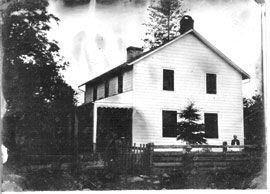
Click to see larger image (124K) 4K)
Ebenezer Doan Farm House
Sharon Temple Museum Archives
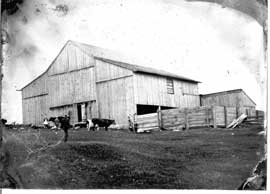
Click to see larger image (124K)
Ebenezer Doan Barn
Sharon Temple Museum Archives
Ebenezer Doan was a “master builder”, an architectural contractor/builder who would oversee the complex process of building construction from design to execution.
Doan was also a farmer, and these photographs show his original home and farm buildings on their original site. They have now been preserved at the Temple museum site.
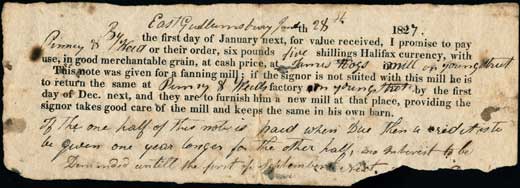
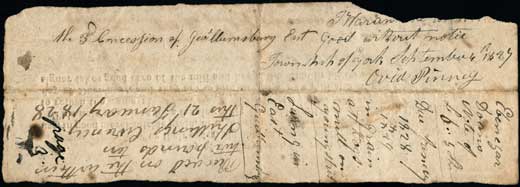
Click to see a larger image (284K)
Promissory note for £6/5 from Ebenezer Doan, 1827
Doan family fonds
Reference Code: F 2145-4-0-1-2
Archives of Ontario
Although a business, the Farmers’ Storehouse became involved in politics. The company organized several petitioning campaigns to the Lt. Governor and the legislature to meet its economic goals. And it also produced leaders like Samuel Hughes, a member of the Children of Peace, who assumed prominent positions in the larger reform movement.
They were however, fought every step of the way by the merchants of Toronto who continued to use debt as a political weapon. All the bills to incorporate the Farmers Storehouse were successfully blocked in the legislature.
